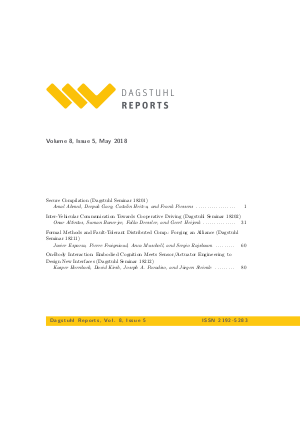Dagstuhl Reports, Volume 8, Issue 5
-
Part of:
Volume:
Dagstuhl Reports, Volume 8
Journal: Dagstuhl Reports (DagRep)

Event
- Dagstuhl Seminars 18201, 18202, 18211, 18212
Publication Details
- published at: 2019-01-08
- Publisher: Schloss Dagstuhl – Leibniz-Zentrum für Informatik
- DBLP: db/journals/dagstuhl-reports/dagstuhl-reports8
Access Numbers
- Detailed Access Statistics available here
-
Total Document Accesses (updated on a weekly basis):
0PDF Downloads
Documents
Dagstuhl Reports, Volume 8, Issue 5, May 2018, Complete Issue
Abstract
Cite as
Dagstuhl Reports, Volume 8, Issue 5, Schloss Dagstuhl – Leibniz-Zentrum für Informatik (2019)
Copy BibTex To Clipboard
@Article{DagRep.8.5,
title = {{Dagstuhl Reports, Volume 8, Issue 5, May 2018, Complete Issue}},
journal = {Dagstuhl Reports},
ISSN = {2192-5283},
year = {2019},
volume = {8},
number = {5},
publisher = {Schloss Dagstuhl -- Leibniz-Zentrum f{\"u}r Informatik},
address = {Dagstuhl, Germany},
URL = {https://drops.dagstuhl.de/entities/document/10.4230/DagRep.8.5},
URN = {urn:nbn:de:0030-drops-101664},
doi = {10.4230/DagRep.8.5},
annote = {Keywords: Dagstuhl Reports, Volume 8, Issue 5, May 2018, Complete Issue}
}
Dagstuhl Reports, Table of Contents, Volume 8, Issue 5, 2018
Abstract
Cite as
Dagstuhl Reports, Volume 8, Issue 5, pp. i-ii, Schloss Dagstuhl – Leibniz-Zentrum für Informatik (2019)
Copy BibTex To Clipboard
@Article{DagRep.8.5.i,
title = {{Dagstuhl Reports, Table of Contents, Volume 8, Issue 5, 2018}},
pages = {i--ii},
journal = {Dagstuhl Reports},
ISSN = {2192-5283},
year = {2019},
volume = {8},
number = {5},
publisher = {Schloss Dagstuhl -- Leibniz-Zentrum f{\"u}r Informatik},
address = {Dagstuhl, Germany},
URL = {https://drops.dagstuhl.de/entities/document/10.4230/DagRep.8.5.i},
URN = {urn:nbn:de:0030-drops-101657},
doi = {10.4230/DagRep.8.5.i},
annote = {Keywords: Dagstuhl Reports, Table of Contents, Volume 8, Issue 5, 2018}
}
Secure Compilation (Dagstuhl Seminar 18201)
Abstract
Cite as
Amal Ahmed, Deepak Garg, Catalin Hritcu, and Frank Piessens. Secure Compilation (Dagstuhl Seminar 18201). In Dagstuhl Reports, Volume 8, Issue 5, pp. 1-30, Schloss Dagstuhl – Leibniz-Zentrum für Informatik (2018)
Copy BibTex To Clipboard
@Article{ahmed_et_al:DagRep.8.5.1,
author = {Ahmed, Amal and Garg, Deepak and Hritcu, Catalin and Piessens, Frank},
title = {{Secure Compilation (Dagstuhl Seminar 18201)}},
pages = {1--30},
journal = {Dagstuhl Reports},
ISSN = {2192-5283},
year = {2018},
volume = {8},
number = {5},
editor = {Ahmed, Amal and Garg, Deepak and Hritcu, Catalin and Piessens, Frank},
publisher = {Schloss Dagstuhl -- Leibniz-Zentrum f{\"u}r Informatik},
address = {Dagstuhl, Germany},
URL = {https://drops.dagstuhl.de/entities/document/10.4230/DagRep.8.5.1},
URN = {urn:nbn:de:0030-drops-98911},
doi = {10.4230/DagRep.8.5.1},
annote = {Keywords: secure compilation, low-level attacks, source-level reasoning, attacker models, full abstraction, hyperproperties, enforcement mechanisms, compartmentalization, security architectures, side-channels}
}
Inter-Vehicular Communication Towards Cooperative Driving (Dagstuhl Seminar 18202)
Abstract
Cite as
Onur Altintas, Suman Banerjee, Falko Dressler, and Geert Heijenk. Inter-Vehicular Communication Towards Cooperative Driving (Dagstuhl Seminar 18202). In Dagstuhl Reports, Volume 8, Issue 5, pp. 31-59, Schloss Dagstuhl – Leibniz-Zentrum für Informatik (2018)
Copy BibTex To Clipboard
@Article{altintas_et_al:DagRep.8.5.31,
author = {Altintas, Onur and Banerjee, Suman and Dressler, Falko and Heijenk, Geert},
title = {{Inter-Vehicular Communication Towards Cooperative Driving (Dagstuhl Seminar 18202)}},
pages = {31--59},
journal = {Dagstuhl Reports},
ISSN = {2192-5283},
year = {2018},
volume = {8},
number = {5},
editor = {Altintas, Onur and Banerjee, Suman and Dressler, Falko and Heijenk, Geert},
publisher = {Schloss Dagstuhl -- Leibniz-Zentrum f{\"u}r Informatik},
address = {Dagstuhl, Germany},
URL = {https://drops.dagstuhl.de/entities/document/10.4230/DagRep.8.5.31},
URN = {urn:nbn:de:0030-drops-98929},
doi = {10.4230/DagRep.8.5.31},
annote = {Keywords: automated driving, cooperative driving, road traffic safety, vehicular networking}
}
Formal Methods and Fault-Tolerant Distributed Comp.: Forging an Alliance (Dagstuhl Seminar 18211)
Abstract
Cite as
Javier Esparza, Pierre Fraignaud, Anca Muscholl, and Sergio Rajsbaum. Formal Methods and Fault-Tolerant Distributed Comp.: Forging an Alliance (Dagstuhl Seminar 18211). In Dagstuhl Reports, Volume 8, Issue 5, pp. 60-79, Schloss Dagstuhl – Leibniz-Zentrum für Informatik (2018)
Copy BibTex To Clipboard
@Article{esparza_et_al:DagRep.8.5.60,
author = {Esparza, Javier and Fraignaud, Pierre and Muscholl, Anca and Rajsbaum, Sergio},
title = {{Formal Methods and Fault-Tolerant Distributed Comp.: Forging an Alliance (Dagstuhl Seminar 18211)}},
pages = {60--79},
journal = {Dagstuhl Reports},
ISSN = {2192-5283},
year = {2018},
volume = {8},
number = {5},
editor = {Esparza, Javier and Fraignaud, Pierre and Muscholl, Anca and Rajsbaum, Sergio},
publisher = {Schloss Dagstuhl -- Leibniz-Zentrum f{\"u}r Informatik},
address = {Dagstuhl, Germany},
URL = {https://drops.dagstuhl.de/entities/document/10.4230/DagRep.8.5.60},
URN = {urn:nbn:de:0030-drops-98933},
doi = {10.4230/DagRep.8.5.60},
annote = {Keywords: distributed computing, distributed systems, formal verification}
}
On-Body Interaction: Embodied Cognition Meets Sensor/Actuator Engineering to Design New Interfaces (Dagstuhl Seminar 18212)
Abstract
Cite as
Kasper Hornbaek, David Kirsh, Joseph A. Paradiso, and Jürgen Steimle. On-Body Interaction: Embodied Cognition Meets Sensor/Actuator Engineering to Design New Interfaces (Dagstuhl Seminar 18212). In Dagstuhl Reports, Volume 8, Issue 5, pp. 80-101, Schloss Dagstuhl – Leibniz-Zentrum für Informatik (2018)
Copy BibTex To Clipboard
@Article{hornbaek_et_al:DagRep.8.5.80,
author = {Hornbaek, Kasper and Kirsh, David and Paradiso, Joseph A. and Steimle, J\"{u}rgen},
title = {{On-Body Interaction: Embodied Cognition Meets Sensor/Actuator Engineering to Design New Interfaces (Dagstuhl Seminar 18212)}},
pages = {80--101},
journal = {Dagstuhl Reports},
ISSN = {2192-5283},
year = {2018},
volume = {8},
number = {5},
editor = {Hornbaek, Kasper and Kirsh, David and Paradiso, Joseph A. and Steimle, J\"{u}rgen},
publisher = {Schloss Dagstuhl -- Leibniz-Zentrum f{\"u}r Informatik},
address = {Dagstuhl, Germany},
URL = {https://drops.dagstuhl.de/entities/document/10.4230/DagRep.8.5.80},
URN = {urn:nbn:de:0030-drops-98944},
doi = {10.4230/DagRep.8.5.80},
annote = {Keywords: Human-Computer interaction, Embodied cognition, User interface software and technology}
}